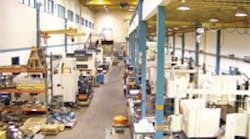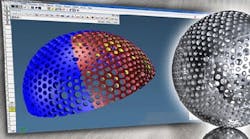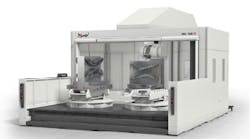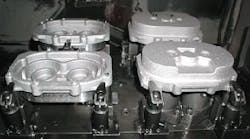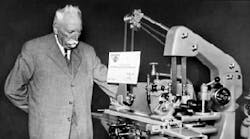Nestled in the rolling hills of Southwestern Pennsylvania is the Hamill Manufacturing Co.
The company was founded in 1952 by William B. Kelly in the rear buildings of his residence in Monroeville. Jeffrey S. Kelly the founder’s son and the current chairman and chief executive officer is acting president of the National Tooling & Machining Association, and was chairman of the NTMA in 2007.
Since its inception, Hamill has been involved in the manufacture and supply of components for various defense related programs. The company’s first order in 1952 was for the U.S. Navy. Since that time, the company has supplied precision equipment for a variety of ships in the Navy's fleet, and this remains Hamill’s core business.
|
Projections are for doubling of the company’s business in 2008 over 2007 levels. Hamill’s current business is very energy centric, and the major part of its growth will come from involvement in various defense and energy centric markets such as commercial nuclear, wind and solar systems. However, the road to this growth and profitability has not been without a few potholes along the way.
“In 1992, we had a near-death experience,” Kelly said.
“We had no new Navy contracts and only six months of work left in the shop. We lost about half of our 121 employees, and we knew we had to find new business and tried to find commercial applications for our expertise and capabilities. We probably had five new-business failures for every success. Having a defense-industry base caused us to have a lot of overhead and structure that is not needed for commercial applications.”
Then, in the mid-1990s, Hamill started supplying flat-screen CRT molds for a new nearby Sony plant. The business grew from about $150,000 in 1997 to $5 million in 2001.
During that time of positive cashflow, the company acquired nine new large machine tools and wiped out its long term debt. However, the unanticipated rapid growth of flat-screen plasma LCD TV screens was the death knell for this business. In 2003, Hamill’s CRT picture-tube mold business slipped to $1 million, and by 2005 it was gone.
The bright side of this experience was that the equipment acquired for the Sony business enhanced Hamill’s machining capabilities in its core defense business. For example, the company got into sinker and wire EDM, 5-axis machining and the manufacture of specialty tools with a high-end tool cutter/ grinder.
Hamill President John Dalrymple explained: “We found that consistent tooling is a key to quality production, and the best way to accomplish this is to do it ourselves.
“We came to realize that reliance on outside suppliers could have an adverse impact on cost and delivery. So, we made a conscientious effort to become self reliant. We expanded our capabilities to be more self sufficient.”
Hamill has the technical expertise and facilities to verify its products from the raw material stage to simulated application operation. It has the engineering and quality staff to provide detailed, comprehensive test reports to sustain confidence in its quality performance.
“We can give raw materials, weldments and machined parts any of the principal nondestructive tests for material integrity. We operate our own metallurgical lab for nondestructive and destructive testing. Because performance testing is often the only true measure of a product’s viability, we load test, pressure test, leak test and wear test many of the products we manufacture,” Dalrymple said.
Although Hamill’s forte is machining of large, complex components and systems made from difficult-to-machine materials such as Inconel and titanium, the company learned they could also develop business without using its machining capabilities.
“We use the support structure developed for our defense business to manage the supply-chain for our solar business. The interesting thing about the solar business is that we act as an integrator of components acquired from various sources around the world. Although we do no machining of these system components, we manage the supply chain, assemble in our plant and do the functional testing,” Kelly said.
Like most shops, Hamill is concerned about the lack of skilled workers in the industry.
In a quarterly letter to employees, Kelly said, “I have concluded that the leaders in our companies and in our industry have to do more of the growing of that workforce on our own. We have to take the lead in convincing a skeptical public that manufacturing and, in particular, precision metalworking manufacturing is alive and has a very bright future.
“Fortunately, we have a lot of allies to help us fill that pipeline. For example, our Pittsburgh NTMA chapter has had a strong working relationship with New Century Careers. NCC has been invaluable in running our apprentice program, helping with the national apprentice contest that we hosted and being an integral part of the BotsIQ effort.” BotsIQ is an initiative spearheaded by the Pittsburgh Chapter of NTMA and area companies such as Hamill to increase interest in manufacturing. High school students learn every aspect of robot building and battle those robots in a gladiator-style competition. “People from many organizations got involved in our Pittsburgh BotsIQ effort, and the results were spectacular. Schools and businesses forged new partnerships. Parents got to see their children succeeding in a complicated endeavor. Young people got a taste for making things that can possibly lead to careers in manufacturing. Without realizing it, they learned math, physics, electronics, pneumatics, machining, welding, designing, teamwork and being responsible for their actions. They learned the hard and soft skills that will help them succeed in manufacturing,” Kelly said.
